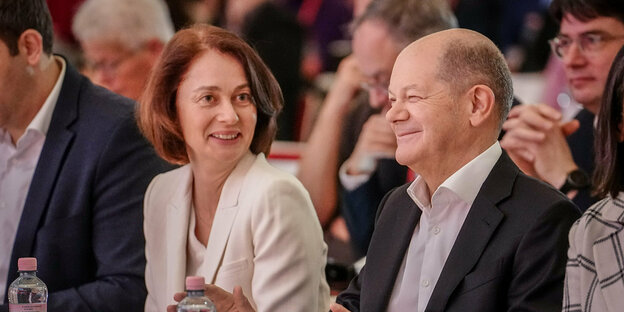Pure European versus Eurofighter: SPD and FDP choose their main candidates for the next European elections in Berlin.

Katarina Barley (SPD), the SPD's main candidate for the European elections, and Federal Chancellor Olaf Scholz (SPD) Photo: Kay Nietfeld/dpa
Berlin taz One election, one government, two candidates. What still connects the SPD and the FDP – and what does not – became clear on Sunday. The Greens already chose candidates and their European electoral program in November, and now the other two government parties have done the same. 150 Social Democratic delegates met in the socialist-futurist congress center on Alexanderplatz, while the FDP met at the same time with 662 delegates in the urban exhibition hall Station am Gleisdreieck.
This year's European elections will also be a women's election campaign: with the exception of the Sahra Wagenknecht alliance and the AfD, the main candidates of the established parties are women: the SPD and the FDP are no exception. The vice president of the EU Parliament, Katarina Barley, is a candidate for the SPD, which was elected with an almost “socialist” result of 98.6 percent. The former Secretary General and Minister of Justice, 55, considers herself “European from head to toe.”
He called the EU elections a directional election: some want more EU, others want to leave completely. Barley warned against a Dexit, a departure of Germany from the EU, such as that aspired by the AfD. “The EU's opponents have learned nothing from Brexit,” Barley warned. This would quickly put the German economy, 55 percent of whose exports went to other EU countries, in dire straits.
However, Barley also targeted those who want to reduce Europe to a “pure internal market and prefer to talk about reducing bureaucracy.” This was not implicitly directed at the FDP. Barley explicitly criticized the FPD's blocking of the EU supply chain law. “Everything is in the bag and who blocks at the last moment? The FDP again!”

Marie-Agnes Strack-Zimmermann (FDP) at the European Liberal Party Conference Photo: Michael Kappeler/dpa
Marie-Agnes Strack-Zimmermann is expected to lead the FDP's election campaign. The 65-year-old defense politician was combative. Strack-Zimmermann is the right choice for Europe as a “Eurofighter”, supported Christian Lindner in his inaugural speech. “StrackZi”, as it is called internally, is celebrated by the grassroots and especially among the Young Liberals. After her candidacy speech (her official election is still pending), the room stood and applauded the Düsseldorf native.
Currently, both parties are fighting together against the lack of popularity. Both are low in the polls: the SPD is at 13 percent and the FDP would be completely eliminated if the next federal election were held. Both have set out to achieve a communicative turn.
Chancellor with a thick voice
“The European elections are the opportunity to send a clear signal against the right,” Olaf Scholz told the Social Democrats. The June 9 election was “not a protest, but a designed election,” Lindner warned around the same time as Scholz in Kreuzberg. Lindner seemed to be in good shape, but the Chancellor spoke with a hoarse voice and was visibly in poor health. Behind him was the SPD's motto for the election campaign: “Germany's loudest voices for Europe.” The “Today Show” will rejoice.
The SPD has Barley and Scholz as faces in the election campaign. In any case, he cannot hide the Chancellor, who is more unpopular than ever among the population. You should hope that the current protests against the AfD will generate momentum in favor of democratic parties.
EU elections, as both the FDP and SPD establish this narrative, are about more than their own parties. It's about democracy. Both are harshly critical of the AfD. “Tolerance of intolerance is the end of a free world,” Strack-Zimmermann shouted. But it is not enough to speak out, it is also necessary to take a stand in everyday life with co-workers and family members if they make “homophobic or anti-Semitic” comments. The center should not open the door on the right even a little, warned Strack-Zimmermann.
SPD leader Lars Klingbeil also counts the Sahra Wagenknecht alliance among the enemies of the EU, along with the Trumps, Putin and Höckes. The latter met on Saturday for the party's founding conference. In its electoral program, the newly founded party calls, among other things, for reconciliation with Russia and also makes reference to Willy Brandt. Which really went against Klingbeil's grain. “Brandt and Schmidt would never have betrayed their European friends,” Klingbeil shouted indignantly. “That's the difference with those who only go on talk shows, sell books and always turn their backs on political responsibility.”
In fact, there is currently a good chance that Putin's calculations will work. Western support for Ukraine is crumbling, in the United States Republicans are blocking aid, and if Donald Trump were to win the White House, he would probably disappear completely. Then Germany would suddenly become the biggest military support. Which, according to Scholz, cannot be achieved: “We are only a middle power,” stated the Chancellor with unusual modesty.
Russian war of aggression in the election campaign
The Ukraine issue is unlikely to be a surefire success in the EU election campaign: popular support for arms supplies is also declining in Germany. In the FDP, solidarity with Ukraine was like a common thread throughout the party conference. Strack-Zimmermann, who has made a name for herself as a defense expert since the war of aggression against Ukraine, criticized Brussels. Ursula von der Leyen's European Commission should have taken care of financing a European army a long time ago. We have to arm ourselves to defend Europe. Under the slogan “Controversy in Europe” and campaign posters with boxing gloves, the FDP shows that it is prepared for confrontation in the electoral campaign.
SPD leader Klingbeil expects an election campaign “in which the wind will blow in our faces.” The SPD won 15.8 percent in the European elections five years ago, a historically poor result. The Liberals celebrated 5.4 percent.